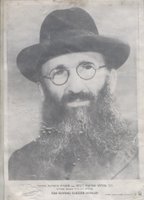The following was recently posted on the “Daily Salanter” by Prof. Yitzchok Levine:
Rabbi Israel used to say that both the hasid and mitnagid ought to be reproved: the hasid for saying “Why do I need a book for religious study, when I have a rebbe?” The mitnagid for saying, “If I have a book for religious study, why do I need a rebbe?”
There are things that we do that we shouldn’t. There are thing that I do that I shouldn’t. There are also things that I don’t do that I should. Things that would help my neshama and my family. That is what Rav Yisrael is saying. Everyone has room for improvement, and not just during the month of Elul.
I know, for myself, that I am far from where I need to be. This was, as I’ve written previously, the impetus in blogging about Rav Yisrael’s 13 Midos. It’s my online Chesbon Hanefesh. I reread all of twelve of my midos postings tonight. The look great on my monitor. They sound great when I read them to myself. When it comes to real life application of the 13 Midos…I feel that I’m further away from where I should be after blogging about them. This isn’t a statement of false-humility. It’s just much easier to read about how I want to act, than it is to put it all into action at times. That’s probably why Rav Yisrael listed them as 13 different midos, so people could work on them one at a time instead of taking on an “all-or-nothing” attitude.
The last Midah #13 is SILENCE. If all goes well, it will be the topic of my next posting. I recently chose not exercise this midah during a conversation and ended up not looking like a mensh. I probably should have blogged about our next midah a lot sooner. The lesson I learned is that I always need to keep myself in ‘check’. I made a mistake.
I could rationalize that “we all make mistakes”, but a quick read of the second chapter of Mesillas Yesharim kills that rationalization in an instant:
THE IDEA OF WATCHFULNESS is for a man to exercise caution in his actions and his undertakings; that is, to deliberate and watch over his actions and his accustomed ways to determine whether or not they are good, so as not to abandon his soul to the danger of destruction, God forbid, and not to walk according to the promptings of habit as a blind man in pitch darkness. This is demanded by one’s intelligence…One who walks this world without considering whether his way of life is good or bad is like a blind man walking along the seashore, who is in very great danger, and whose chances of being lost are far greater than those of his being saved. For there is no difference between natural blindness and self-inflicted blindness, the shutting of one’s eyes as an act of will and desire.
The RAMCHAL says it all. For there is no difference between natural blindness and self-inflicted blindness, the shutting of one’s eyes as an act of will and desire. I am quick to close my own eyes to the worst aspects of my own personality. I close my eyes to the inconsistencies that creep up every once in a while. While I try to be constistant with what I blog about and how I act, there are times when I mess up. There are times when I get hot-headed, stressed out, or just forget that we are all created b’tzelem Elokim. Either I notice it myself or, more often than not, Hashem sends a sheliach (messenger) to let me know.
Rav Moshe Weinberger mentions on his “Inspired Parenting” shirum that the ikar nachas (the essence of happiness) for a parent is to see their child fall and get up again. The comfort in knowing that I can bring nachas to Hashem, my father, gives me strength to get up again after I fall.
To be concluded…






